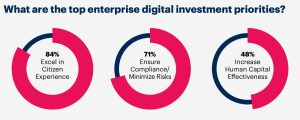At the first AI for Good Innovation Factory Live Pitching Session last week, tech startup entrepreneurs had 4 minutes each to pitch their artificial intelligence (AI) project remotely to a team of mentors.
During the webinar, 5 entrepreneurs had the opportunity to showcase their tech startup projects, whose solutions aim to accelerate our progress to meet any one of the United Nations Sustainable Development Goals (SDGs).
5 startup projects
Founder and CEO Mikela Druckman, presented UK tech startup Grey Parrot, which offers a computer vision for waste management – targeting customers in the waste management industry.
Iran Davar Ardalan, Founder and Chief Storytelling Officer presented IVOW AI and its product CultureGraph, an Enterprise API Platform that enhances consumer engagement through the lens of culture.
Founder Javier Cardona, presented the Latin-American tech startup 1DOC3 which provides easy access to doctors in the Spanish-speaking world.
Co-founder and CSO Kevin Lee, presented EQ4ALL. Supported by the Republic of Korea’s Ministry of Information and Communication Technologies, the tech startup has a mission to bring the deaf to have equal accessibility to information, education and communication.
Founder Markus Pohl, presented Child Growth Monitor, a mobile app, released early because of COVID-19, that measures and diagnoses children for malnutrition.
Each project presentation was followed by a Q&A, which gave the opportunity for the tech startup entrepreneurs to receive advice and feedback from the mentors.
What it takes for startups to succeed
Before the entrepreneurs got going, however, the session began with mentors sharing insightful tips on what it takes to be a tech entrepreneur — and opportunity-rich areas for innovation, such as AI and digital health.
“You’ve got to have problem and solution validation, and then product and market fit, so that customers agree that there is something they are willing to pay for,” said Stephen Ibaraki, Co-Chairman of the Association for Computing Machinery (ACM) Practitioner Board.
Equally important is how good and solid the team is, says Ibaraki, citing grit, talent, hard work, perseverance, optimism and continuing drive as key elements for tech startup success.
Vera Futorjanski, Speaker, Advisor, Digital Platforms and Ecosystems Expert, believes that tech startups are the creative force that will be much needed to build whatever this new post-pandemic normality will look like.
Startups, says Futorjanski, “are agile and fast. We need this innovation going forward … in all sectors,” she says.
Futorjanski is sure that working from home is here to stay, and says that “it will be a tough time for startups, as there might not be as much cash available.”
On the other hand, she is confident that it is a great time to build businesses, and that downturns are a good time to start companies.
“The silver lining is that you can find talent easier – and talent is an important core part of building an ecosystem,” she told the audience.
Futorjanski believes that governments will realize how important those ecosystems and tech startups are.
“I’m optimistic: I think we will see more support [for startups, from governments] going forward,” she says. “As Charles Darwin said: ‘Those who survive are the ones most adaptable to change.’ This is the core trait of a startup in this time of uncertainty.”
AI and innovation
Neil Sahota, Worldwide Business Development Leader at IBM Watson and author of the book “AI Revolution,” shared his thoughts on AI and innovation.
“AI is going to be a revolutionary force, because it is going to feed the Fourth Industrial Revolution,” he says.
It is not about automation, says Sahota, explaining that automation is all about improving something that you already have. “The real value is actually in innovation,” he says.
“Think about how much is going to change in the next 10 years – in our personal and professional lives,” says Sahota. “We have already seen amazing changes. If we were to jump forward to 2030 and look back, we would be amazed to see how far we have actually come in a short time.”
AI, Big Data and digital health solutions
Zhi Zhen Qin, Senior Technical Officer at the United Nations Office for Project Services, spoke about how traditional public health control methods have limitations when it comes to tackling COVID-19. The potential of digital technology, says Qin, “can have a huge benefit in augmenting traditional public health strategies.”
Qin highlights the usefulness of real-time data tracking. “We see countries adapting their national strategy with data that they are updating every day,” she says.
The power of AI has a role to play in predicting the prognosis of COVID-19 and to detect other infectious diseases — not to mention, chest X-rays and CT scans from hospitals around the world, said Quin.
“Big data has been a tremendous help to public health – there is a lot of big data analysis,” says Qin, adding that without big data it is not possible to model disease activity, predict potential growth, perform strategic analyses, or measure population impact.
Qin is sure that the healthcare industry will see big changes in the future, not just for COVID-19, but also for other diseases and healthcare in general. The healthcare industry, she says, “has been compelled to adopt digital technology.”
Key challenges to scaling up
Sasha Cahill, Advisor at IBM Cloud Hyper Protect Accelerator highlights the most important challenges that tech startups need to overcome to actually scale up.
Cahill agrees with other mentors that the technology has to be needed – and the team has to be the right one – for a tech startup to succeed.
Understandably, during this crisis, many new tech startups are in the healthcare sector.
Cahill also shared insights specific to technology for healthcare.
“In the United States, physician time is limited to 10-15 mins per patient. If the technology is too complex to use, then both physician and patient will be frustrated,” says Cahill. “How can we as entrepreneurs create new delivery models which can be monetized?”
Cahill advises budding healthcare startups to think carefully about the patient experience.
“Patients are concerned,” she says, “and they will likely want care in a place where they are most comfortable – and that is going to be their home setting.”
“I want to challenge entrepreneurs to think about those impacts, and how we can think about models that are scalable,” said Cahill.
Pitch your startup!
The Innovation Factory Live Pitching Sessions will continue to showcase a diverse set of emerging entrepreneurs with promising AI ventures to tackle our world’s greatest challenges, and will include discussions with featured mentors on topics related to social impact.
Do you have an innovative idea or a tech startup using AI to advance the SDGs?
If so, then why not sign up for a chance to pitch in the ITU AI for Good Innovation Factory? Applications are open until 30 June. Apply here.
_________________________________________________
The 2020 AI for Good Global Summit is being held online throughout the year.
(Photo by GIANRIGO MARLETTA/AFP via Getty Images)
Source of Article



